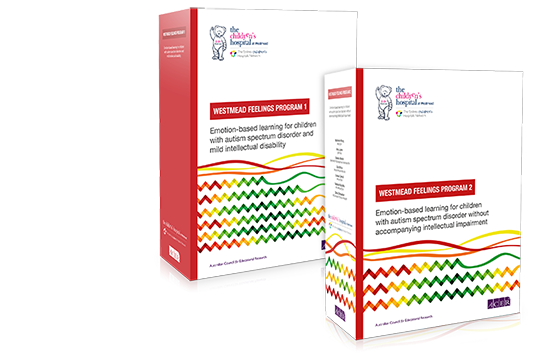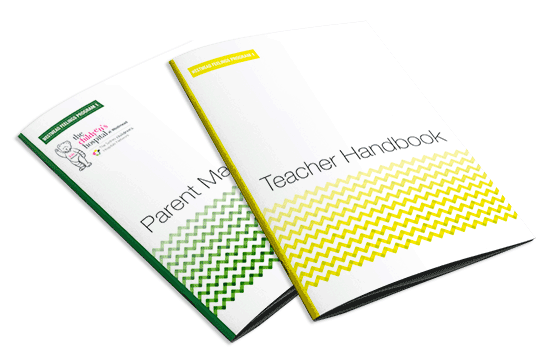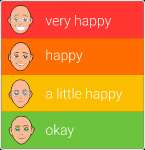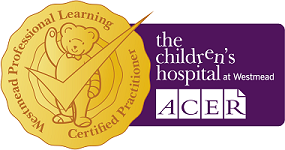Developing emotional skills with the Westmead Feelings Program
A pair of 15-month intervention programs teaching autistic children about emotional understanding and social awareness, in close collaboration with parents, teachers and facilitators. Available for two different ability levels.
The Westmead Feelings Program develops parents’ and teachers’ emotion coaching skills, supporting children to understand emotions, solve problems and ultimately manage their feelings in everyday settings.






Understanding and recognising emotions
Happy, sad, worried, angry! Everyday emotions can be difficult to manage. The Westmead Feelings Program teaches autistic children to understand and manage those emotions through a wide range of activities and videos.
Promoting emotional skills at home and school
Emotions are raw, honest and real but sometimes too difficult to understand or to manage. The Westmead Feelings Program teaches autistic children, parents and teachers to understand and manage emotions in a day-to-day setting.
Parents and teachers are being upskilled to emotion coaches.
Expressing intensities of emotions
The ability to regulate behaviour is comprised of a set of skills that can be taught and improved over time for all children. The Westmead Feelings Program teaches autistic children self-regulation skills to manage and problems solve emotions in social situations with the help of the Feelings Strength Bar.
Westmead Feelings Program 1
Westmead Feelings Program 1 is designed to meet the learning needs of autistic children aged 8-12 years with mild intellectual disability or aged 6-8 years and no intellectual disability who may or may not read, can draw simple pictures or write a few key words and can pay attention for at least a few minutes at a time.
Westmead Feelings Program 2
Westmead Feelings Program 2 is designed to meet the learning needs of autistic children aged 8 to 14 years old without accompanying intellectual impairment and who have fluent speech, and who are able to read and write.
The Westmead Feelings Program in action
Supporting children, parents and teachers


Westmead Feelings Program Telehealth Support Materials
Telehealth Support Materials are only available to Westmead Feelings Program Facilitators.
If you have purchased the program or completed the course in the past and have troubles to access those resources, please send an email to sales@acer.org.
Module 1 for children
Facilitator introduces children to four primary emotions – happy, sad, worried and angry – and explains that there are different intensities of feelings. Children learn this concept with the help of the Feelings Strength Bar.
- How to use the Feelings Strength Bar to rate intensities of feelings
- How to recognise happy, sad, worried and angry facial features
- How different people can have different feelings in the same situation
Module 1 for parents and teachers
Facilitator works closely with parents and teachers to ensure the best possible outcome for each child. Parents and teachers are introduced to their role as ‘emotion coaches’, and learn about how to support children to talk about their emotions.
- What is the Westmead Feelings Program?
- The emotional and social challenges for children on the autism spectrum
- How children with on the autism spectrum communicate
- How to be an emotion coach
- How to use the Feelings Strength Bar
- How to use visual cueing
- How to use the communications book
Module 2 for children
Children learn about feelings in themselves and in others, to foster a greater understanding of the causes of and influences on people’s emotional experiences and behaviour. They also learn specifically tailored cognitive-behavioural therapy strategies.
- How to solve problems, using structured visual tools
- Reading emotional signs in faces, bodies and voices
- Perspective taking, or how different people can have different feelings in the same situation
Module 2 for parents and teachers
Parents and teachers continue to fine-tune their emotion-coaching skills, and learn about problem solving and perspective taking.
- How to solve problems, using structured visual tools
- Reading emotional signs in faces, bodies and voices
- Perspective taking, or how different people can have different feelings in the same situation
- Putting problem solving and perspective taking together
Module 3 for children
Children learn a range of strategies for dealing with difficult or unpleasant emotions, to feel more in control and accepting of their emotions, enabling them to react more appropriately and in more socially positive ways.
- Management of not-so-good feelings
- How to use the Feelings Control Kit strategies
- Recap of previously learned skills and strategies
Module 3 for parents and teachers
Parents and teachers learn ways by which they can support children's emotion management skills.
- Troubleshooting skills from Modules 1 and 2
- How to use the Feelings Control Kit strategies
- Effective use and promotion of emotion regulation skills
The Boosters comprise one session each for children, teachers and parents approximately six months after completion of Module 3.
- Revision of all Westmead Feelings Program skills
- Troubleshooting and skill refinement based on parent and teacher feedback
The online Westmead Feelings Program Facilitator Certification courses are designed to provide professionals with the knowledge, skills and confidence to effectively implement the 15-month Westmead Feelings Programs at the highest standard. Separate training is offered for Westmead Feelings Program 1 and Westmead Feelings Program 2.
This course is suitable for teachers, special educators, psychologists and allied health and disability practitioners who intend to provide Westmead Feelings Program in their setting, and wish to gain the knowledge, skills and confidence to successfully implement the program.
Delivery mode: Online
Time and duration: 20 hours of online coursework, over approximately 10 weeks


Participants will be able to:
- demonstrate the capacity to useWestmead Feelings Program, including all key resources, to teach children with mild ID the skills required for understanding emotions, problem solving, perspective taking and managing emotions
- demonstrate the capacity to use Westmead Feelings Program to teach parents and teachers of children with mild ID how to be ‘emotion coaches’, supporting skill development in understanding emotions, problem solving, perspective taking and managing emotions
- analyse and critically evaluate a range of positive behaviour support strategies to be able to effectively deliver Westmead Feelings Program to autistic children with mild ID
- apply knowledge to implement differentiated teaching strategies.
The course consists of four units and two learning assurance tasks. It covers proficiency in 22 separate areas of Westmead Feelings Program, through interactive tasks, activities and videos.
Unit 1: introduction and overview
Unit 2: Teaching ‘Westmead Feelings Program Module 2: Understanding emotions’ to children, parents and teachers
Unit 3: Teaching ‘Westmead Feelings Program Module 3: Problem solving and perspective taking’ to children, parents and teachers
Unit 4: Teaching ‘Westmead Feelings Program Module 4: Managing emotions’ to children, parents and teachers.
The learning assurance tasks are a multiple-choice quiz and a 5−20 minute video demonstrating proficiency in one area of the Westmead Feelings Program 2 delivery. On successful completion of the course, participants will receive an accredited certificate, enabling participants to facilitate Westmead Feelings Program 1 at the highest standard with children, parents and teachers in schools, hospitals and other relevant clinical settings, and the opportunity to be listed on ACER’s online certified practitioners’ register.
The Psychology Board of Australia
The course satisfies the guidelines for 20 hours of continuing professional development required for the annual registration of psychologists.
Find out how the Westmead Feelings Program
uses research-based learning characteristics and teaching strategies to
benefit autistic children, their parents and teachers.
Westmead Feelings Program 1
Emotion-based learning for children with autism spectrum disorder and mild intellectual disability. Westmead Feelings Program 1 is aimed at verbal children, who may or may not read, can draw simple pictures or write a few key words and can pay attention for at least a few minutes at a time.
Westmead Feelings Program 1 is designed to meet the learning needs of autistic children aged 8-12 years with mild intellectual disability or aged 6-8 years and no intellectual disability.
The Westmead Feelings Program 1 Resource Kit includes
- Facilitator's Resource Kit
- Facilitator's manuals
- Facilitator's digital resources
- Child materials
- Parent materials
- Teacher materials
Westmead Feelings Program 2
Emotion-based learning for children with autism spectrum disorder and no accompanying intellectual impairment. Westmead Feelings Program 2 is aimed at verbal children, who can read and write.
Westmead Feelings Program 2 is designed to meet the learning needs of autistic children aged 8 to 14 years old without accompanying intellectual impairment and who have fluent speech, and who are able to read and write.
The Westmead Feelings Program 2 Resource Kit includes
- Facilitator's Resource Kit
- Facilitator's manuals
- Facilitator's digital resources
- Child materials
- Parent materials
- Teacher materials
Find a Westmead Feelings Program Facilitator
Westmead Feelings Program Facilitators are highly trained and equipped
with the knowledge, skills and confidence to effectively implement the 15-month Westmead Feelings Programs
at the highest standard.
Research
The Westmead Feelings Program has a strong research basis and has been studied in more than eight research studies evaluating teaching content, teaching materials and outcome measures in a range of settings (including hospital outpatient department and school settings) and by a range of Westmead Feelings Program facilitators (including psychologists, school counsellors and special educators). The Westmead Feelings Program has consistently demonstrated clinically significant treatment benefits, resulting in improved emotional competence, social skills and mental health for children with autism spectrum disorder and their families.
Results of Westmead Feelings Program research have been presented by the authors of the program at national and international conferences and studies of Westmead Feelings Program (formerly known as Emotion-Based Social Skills Training, or EBSST) have been published in peer-reviewed journals.
Conclusions
- The Westmead Feelings Program in schools significantly improves teacher-reported emotional competence in children with autism spectrum disorder and mild intellectual disability, comparing treatment to a control group.
- There are clinically significant improvements in mental health for treatment compared to control groups in children with high-functioning autism spectrum disorder.
- Completing Westmead Feelings Program results in positive trends for parent-reported emotional competence, parent- and teacher-reported social skills and parent mental health.
- For facilitators who have completed Westmead Feelings Program facilitator training and accreditation, there is a high level of skills and competence acquired relating to Westmead Feelings Program delivery so that no further professional support is required for successful implementation.
More information on the research can be found here:
Teaching social–emotional skills to school-aged children with autism spectrum disorder


Dr Belinda Ratcliffe, is Lecturer in Clinical Psychology (Child & Adolescent) in the School of Social Sciences and Psychology at the University of Western Sydney. Belinda holds a doctorate in Clinical Psychology and Autism from the Sydney Medical School at the University of Sydney and has an established Clinical Psychology practice, utilising over 17 years of experience in autism spectrum disorder, intellectual disability and mental health in children and adolescents.
Since 2007, Belinda has been dedicated to the development, evaluation and dissemination of the Westmead Feelings Program. Belinda is the lead author for the ‘Westmead Feelings Program 1’ and has received multiple awards and prizes in recognition for her work. Belinda is passionate about translational research, teaching and clinical practice, aimed at improving the mental health and wellbeing of children and adolescents with a disability.


Dr Michelle Wong founded the Westmead Feelings Program in 2004 and is its clinical research leader. The Westmead Feelings Program was inspired by Dr Wong’s work with children with autism and their families who had graduated from early intervention programs and needed to learn emotion skills as they progressed through school, utilising scientific methods and a theoretical framework. As a Senior Clinical Psychologist at the Children’s Hospital at Westmead, Dr Wong further developed the Westmead Feelings Program and its research evidence base. Dr Wong continues to work as a clinician with young people with autism and their families, collaborates with organisations in Australia and internationally who support people on the autism spectrum, and has been awarded for her work in child health. Dr Wong is a clinical and research mentor to other professionals and completed her PhD and Doctorate in Clinical Psychology at the University of Sydney where she is an Honorary Associate.


Dr David Dossetor is Director for Mental Health for the Sydney Children’s Hospital Network, Clinical Associate Professor at Sydney Medical School and a child psychiatrist with a special interest in intellectual disability and autism spectrum disorder at the Children’s Hospital at Westmead. He has been involved in the Emotion-Based Social Skills Training for Autism team and research since its inception in 2004, from which the Westmead Feelings Program has developed. Dr Dossetor established the Developmental Psychiatry Team at the Children’s Hospital at Westmead, and developed key partnerships with the Statewide Behaviour Intervention Service of New South Wales Family and Community Services and with the New South Wales Department of Education. Dr Dossetor promotes partnerships and collaborations to support the needs of children and young people with autism and intellectual disability. He established an inter-agency tertiary clinical service and a multidisciplinary training curriculum in mental health and intellectual disability, now published in a textbook (www.ipcommunications.com.au). Dr Dossetor also established the Children’s Hospital at Westmead School-Link Service, promoting the mental health of students with intellectual disability and autism spectrum disorder in schools. These organisational partnerships have facilitated research and service development in mental health prevention, promotion and intervention. Initiatives include Parent Training Intervention in Special Schools, different adaptations of the Westmead Feelings Program, and a cartoon animation for mental health awareness raising in schools. Dr Dossetor is also a member of the editorial panel for the Journal of Mental Health of Children and Adolescents with Intellectual and Developmental Disabilities (www.schoollink.chw.edu.au), which is a free electronic journal.


Dr Lisa Brice is a clinical psychologist at Asperger Services Australia. She completed her doctorate and masters in psychology at Yeshiva University, New York. She also has a Masters of Social Science Degree from the City University of New York and a Bachelor of Arts Degree from the University of Queensland. Lisa has worked in a range of clinical settings such as hospitals, schools, mental health services and specialist early intervention services both in Australia and the United States.


Dr Vicki Grahame is a Consultant Clinical Psychologist and Honorary Clinical Senior Lecturer at Newcastle University in the UK. She is the Clinical Lead for the Complex Neurodevelopmental Disorders Service (CNDS), Newcastle, England, which is a specialist tertiary service that provides second opinions about children and young people who may have an Autism Spectrum Disorder(ASD) and other complex mental health or neurodevelopmental problems. She has expertise in the successful planning and delivery of randomised controlled trials of complex interventions for children with ASD and their families and in adapting interventions to meet the needs of children and young people with ASD and co-morbidities. She has specialist training in Paediatric Neuropsychological Assessments.
What age range is Westmead Feelings Program for?
Westmead Feelings Program 1 is designed to meet the learning needs of children:
- aged 8-12 years with ASD and mild intellectual disability
- aged 6-8 years with ASD and no intellectual disability.
Westmead Feelings Program 2 is designed to meet the learning needs of children:
- aged 8 to 14 years old with ASD without accompanying intellectual impairment.
Do children need to be able to read or write?
Westmead Feelings Program 1 is aimed at verbal children with pre-literacy skills at about the level of a child in the first year of primary school. They may or may not be able to read, but can draw simple pictures or write a few key words and can pay attention for at least a few minutes at a time.
Westmead Feelings Program 2 is aimed at children with fluent speech, who are able to read and write, and pay attention for at least five minutes at a time.
I’m a parent. Where can my child access Westmead Feelings Program?
Westmead Feelings Program can only be delivered by facilitators who are trained and certified by ACER and The Children’s Hospital at Westmead, Sydney.
Facilitators who are trained and certified in delivering the program work in a variety of public and private settings. See the list of trained and certified Westmead Feelings Program facilitators here.
You can also ask your local education or health provider if they are able to offer Westmead Feelings Program.
I’m an education or health care professional. How can I offer Westmead Feelings Program to children that I work with?
For some professionals, Westmead Feelings Program can be delivered without completing facilitator training and certification. For other professionals, online facilitator training through ACER is required so that Westmead Feelings Program can be delivered. Read more about information on qualification requirements here.
Can I purchase a Westmead Feelings Program Resource Kit without completing the online training course?
Psychologists, speech pathologists, teachers and other allied health professionals are able to purchase Westmead Feelings Program without further training. To register your qualifications please create an ACER Online Shop account, or contact our customer service department at shop.support@acer.org to discuss specific requirements.
I’ve been trained in Westmead Feelings Program. How can I purchase materials?
Order through the ACER Online Shop
Is Westmead Feelings Program only a group-based intervention program or can I use it with children 1:1?
Westmead Feelings Program has been researched as a group-based intervention. However, Westmead Feelings Program is also successfully used clinically in 1:1 settings.
Is Westmead Feelings Program covered under the National Disability Insurance Scheme?
Westmead Feelings Program can be funded by an NDIS support package.
Westmead Feelings Program can be NDIS-funded in individual sessions, school-based sessions, family sessions and also in groups.
A registered provider can offer individual or group Westmead Feelings Program sessions to help an NDIS participant achieve their goals related to areas that might include behaviour, emotion regulation, social skills and improving home and peer relationships.
There are lots of options; providers and families should work out together the best way to deliver Westmead Feelings Program for each child.
Is Westmead Feelings Program covered under Medicare?
Children who have a Mental Health Care Plan or Chronic Disease Management Plan can use this funding for Westmead Feelings Program sessions run by registered Medicare providers (e.g. psychologists, occupational therapists, speech therapists).
Westmead Feelings Program can be implemented to achieve Mental Health Care Plan or Chronic Disease Management Plan goals related to behaviour, emotion regulation, social skills and improving home and peer relationships.
Is there a version of the Westmead Feelings Program for adolescents or adults?
Not yet, but please check back regularly for updates on new programs.
Can I carry out Westmead Feelings Program sessions remotely?
Facilitators should use their professional judgement about how the children they are working with will adapt to sessions conducted remotely. The program is designed to be implemented with groups of up to seven children, but has also been shown to be effective when carried out 1:1. Where appropriate, parents or family members may take the role of other children in group activities.
Videos and other content supplied on the Facilitator’s USB may be shared on-screen within online videoconferencing apps. Content should not be removed from the file structure of the USB and shared electronically, both to maintain the copyright in the resources and to ensure that the USB menu functionality is not adversely affected.













